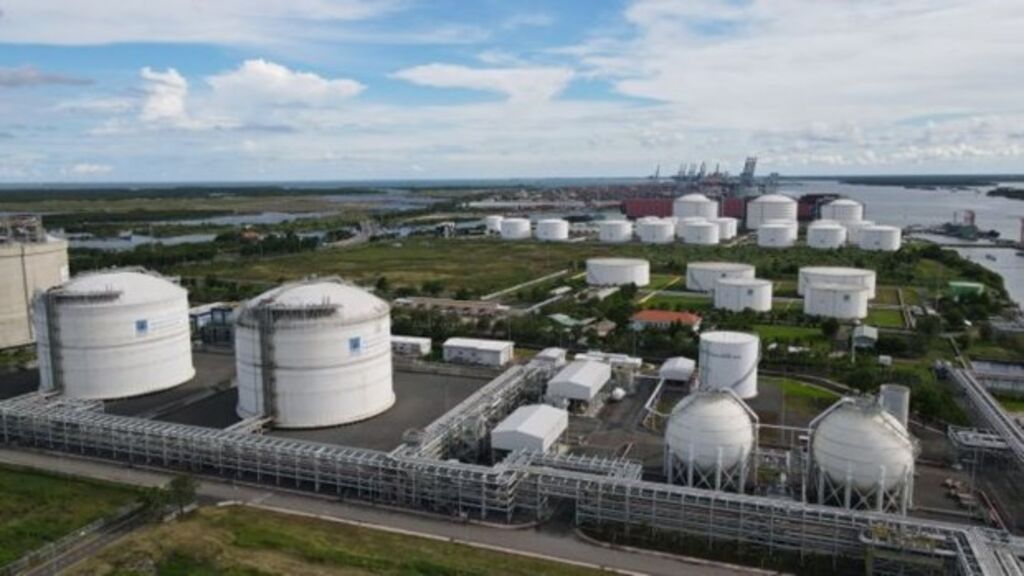 |
| LNG Thi Vai Storage in the southern province of Ba Ria-Vung Tau is the country's only LNG complex__Photo: VNA |
There are still issues to be resolved with the recently approved National Power Development Plan 8 (PDP8), namely how to attract and encourage private investors, including green financing from foreign financial institutions, according to the Ministry of Planning and Investment (MPI).
Under PDP8, the estimated capital requirement for the development of power sources and transmission grids was estimated at nearly USD 135 billion. Of which, USD 119.8 billion was allocated to power sources, averaging USD 12 billion per year, and USD 14.9 billion to transmission grids, averaging USD 1.5 billion per year.
For the 2031-50 period, the estimated capital requirement for the development of power sources and transmission grids ranges from USD 399.2 billion to USD 532.1 billion. Of which, USD 364.4 billion to USD 511.2 billion were allocated to power sources, averaging USD 18.2 billion to USD 24.2 billion per year, USD 34.8 billion to USD 38.6 billion to the transmission grid, averaging USD 1.7 billion to USD 1.9 billion per year.
Given the substantial amount of capital requirement of the plan, MPI stressed the importance of participation from all economic players, as well as the diversification of funding sources, including foreign partners as a key component to the plan's success.
"Securing the necessary financial sources remains a challenging issue, which may pose various obstacles to the successful implementation of the country's power plan," said MPI in a public statement.
Besides relying on state-owned enterprises to carry out numerous projects under PDP8, MPI advised the government to seek out and encourage private investors to participate in the plan.
As of now, there was not yet a working mechanism for encouraging and selecting private investors in the power sector, which may help ensure PDP8's smooth progress.
"We have observed instances in which projects experienced prolonged delays, even in the investment phase; instances in which projects were approved and assigned but not yet implemented or were being carried out at an extremely slow pace. There were even instances in which capacity for implementation was not met but projects were not revoked," said MPI.
While waiting for the completion of PDP8's first phase, Vietnam has been actively looking for alternative energy sources including liquefied natural gas (LNG). The power-hungry Southeast Asian economy, now established as a major manufacturing hub in the Asia-Pacific region, received its first LNG shipment last month.
Under PDP8, the country aims to generate an equivalent of 20GW of electricity from LNG by 2030, starting from zero. This figure is approximately 15 percent of the country's total electricity output, providing power to 20 million households and helping to alleviate the load on the national electricity system.
However, numerous hurdles will likely hamper the country's ability to ensure the supply of LNG at a reasonable cost, according to industry experts, especially as the country is making its moves to transition away from coal.
The global LNG market has witnessed increased delays and uncertainties in securing long-term LNG supplies. Meanwhile, Vietnam will have to compete with buyers from China, South and Southeast Asia, who have managed to ink a number of long-term deals this year.
Without a long-term contract, the country will likely experience volatile spot prices, which have been recorded to skyrocket to USD 70 per British thermal unit (mmBtu) last year before stabilizing at the current USD 12 per mmBtu.
Meanwhile, there are in-house problems that must be worked out by power suppliers and Electricity Vietnam (EVN) regarding supply contracts and pricing as wind and solar power investors continued to voice their grievances over difficulties in price negotiations and extending project deadlines with the Power Trading Company (EVNEPTC) a subsidiary of EVN.
Experts have warned current disagreement over pricing could slow down the sector's development while leaving a significant portion of the country's power capacity stranded.- (VNA/VLLF)









